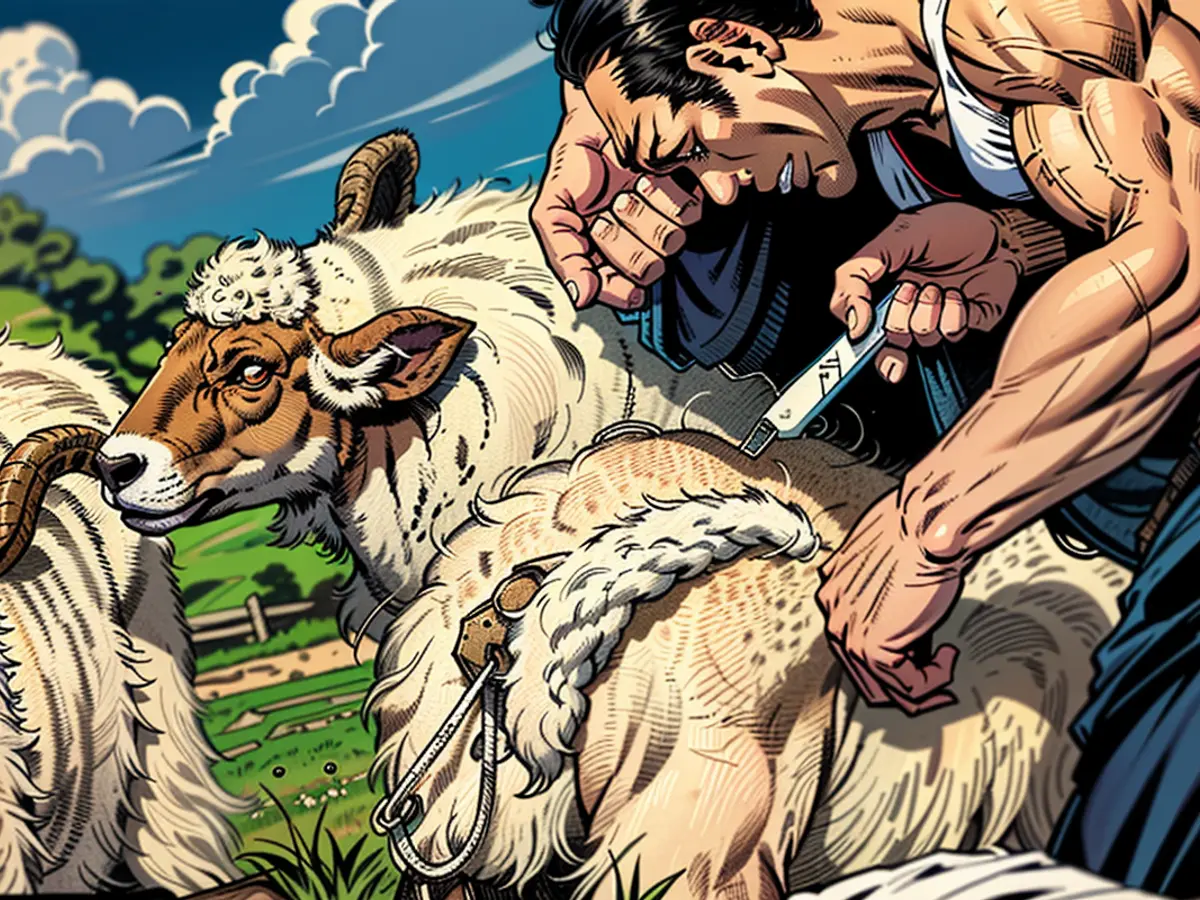Understanding the Essentials of Bluetongue Disease
Over the past few months, the Bluetongue disease, harmful to cattle and sheep, has spread broadly across most of Germany, leaving Berlin as the sole exception, as reported by the Friedrich-Loeffler-Institute (FLI). The cause of this outbreak is believed to be disease-carrying midges, which have been present in significant numbers and highly active for weeks, according to the FLI. Let's explore the essential aspects of this epidemic.
What kind of microbe is it?
It's a virus known as the Bluetongue virus, or BTV for short. This virus primarily affects sheep and cattle, along with South American camelids, goats, and wild ruminants. The virus exists in around 20 different variants, referred to as serotypes. At present, the serotype BTV-3 is spreading in Germany and other European countries.
How dangerous is the virus for humans?
BTVs are typically transmitted through the bites of blood-sucking midges from the Culicoides group. These midges are small, thriving during warm seasons in humid, warm weather. According to a study published in "Science," these midges can fly for several kilometers in just a few days and even hundreds of kilometers with tailwinds. Animal transportation can also contribute to the spread of the virus.
Upon transmission through the bite of an infected midge, the virus multiplies in specific lymph nodes in infected animals. The animals usually develop lifelong immunity. Once infected with the current variant, animals will not be sick again, but they can contract other serotypes. For humans, however, the viruses are generally harmless, as they do not transmit the pathogen, as confirmed by the FLI. Meat and milk products from animals susceptible to Bluetongue can be consumed safely.
How are the affected animals?
Bluetongue disease is severe and can lead to death, depending on the serotype. Sheep often experience intense mouth pain and lameness, and the tongue's characteristic discoloration is less common, reported by the FLI. Cattle, on the other hand, show milder symptoms.
Based on data from the Netherlands, which has been affected longer, on average, around 25% of sheep in managed facilities die from the current variant BTV-3/NET2023, making it more lethal than other variants. In some operations, over 70% of the sick animals have died. Mortality rates are also increased in cattle, and milk production can decrease significantly in dairy cows.
What is the current situation?
Recently, the number of affected livestock operations has substantially increased in various federal states. In June, the FLI recorded only 13 affected operations nationwide, but in July, there were more than 1200. By August 23rd, over 4800 affected operations had been reported. According to the FLI's assessment, BTV-3 will continue to be a concern in the coming year.
In total, there are approximately 10.6 million cattle in Germany (as of May), with around 3.7 million being dairy cows. The German Farmers' Association reports that more than 75% of cattle are kept in Bavaria, Baden-Württemberg, Lower Saxony, North Rhine-Westphalia, and Schleswig-Holstein.
Spread of Bluetongue Serotype 3 Similar to 2007
The FLI states that the spread of Bluetongue disease serotype 3 is similar to that of serotype 8 in 2007. During that time, it was also shown that the pathogen can spread rapidly. Following a modest onset, the number of new cases typically increases significantly in the second half of the year and subsequently decreases towards the end of the year, depending on the midges' occurrence and activity.
Origin of BTV-3/NET2023
The origin of BTV-3/NET2023 is believed to be in southern Africa, but this has neither been confirmed nor refuted by the FLI. The significant differences observed in the BTV-3 outbreaks in Europe suggest a distant origin. Global trade is believed to be the most likely cause of the virus's spread, as infected midges might have been introduced through materials, animals, or sheep trading.
In the Netherlands, this variant first appeared in September 2023 and spread rapidly. The first infection in Germany was confirmed in October 2023 on a sheep farm in North Rhine-Westphalia. Experts generally agree that climate change facilitates outbreaks of the disease by making it easier for midges to overwinter and spread more quickly in the following months, while higher temperatures also promote the reproduction of the pathogen in midges.
Impact on Farmers
The outbreaks have led to Germany's "free from Bluetongue disease" status being suspended. Animals from affected areas can only be transported to BTV-free areas after testing and spraying with insecticides, which may hinder trade. However, since all federal states are now affected, trade within Germany should be possible again without special requirements, according to the farmers' association.
Trade with BTV-free regions in the EU is highly restricted or subject to specific conditions. Farmers also face losses due to reduced milk production and deceased animals. During the BTV-8 epidemic in 2007, the German animal disease funds paid compensation for 33,233 deceased sheep and 10,240 cattle, according to the FLI.
Countermeasures
This information should help provide valuable insight into the Bluetongue disease outbreak and countermeasures that are being taken to address this issue. Please monitor further developments and take all necessary precautions to protect your livestock.
According to an urgent decree, the utilization of three BTV-3 vaccines is permitted. These vaccines can decrease symptoms and hinder viral multiplication in animals, yet they don't supply complete shield, as even immunized creatures might still contract the infection. The Federal Livestock Institute emphasized that vaccination is the sole viable security measure for animals. Nevertheless, the willingly acceptance of vaccination, generally covered by animal proprietors, is significantly lower compared to compulsory vaccination, often subsidized by the animal illness fund.
As per the farmers' association, "vaccinations are prevalent," however, they arrived too late for the initial affected areas. The adequacy of safeguarding the animal populaces through vaccinations will be a significant element in determining the length of the epidemic.
The spread of Bluetongue disease, including the current serotype BTV-3, predominantly affects livestock such as sheep, cattle, goats, and camelids, causing severe symptoms like mouth pain and lameness in sheep and milder symptoms in cattle. Fortunately, the viruses are generally harmless to humans, with the FLI confirming that they do not transmit the pathogen.
The agricultural sector in Germany has been significantly impacted by this outbreak, leading to increased mortality rates in affected animals and reduced milk production in dairy cows. As a response, the utilization of three BTV-3 vaccines has been permitted, although their effectiveness is limited as immunized animals can still be infected. However, the willingness to accept vaccination among livestock owners is lower compared to mandatory vaccination, often subsidized by the animal disease fund.









